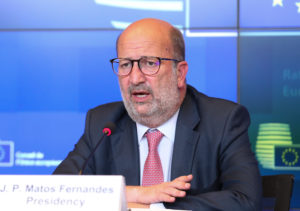
The government, through the Minister of Environment and Climate Action, João Pedro Soeiro de Matos Fernandes, has decided to increase the amount available under the Environmental fund to encourage the introduction of low-emission vehicles, especially two-wheelers, such as bicycles.
By the publication on August 24, 2021, of Dispatch n ° 8363/2021, the Executive amended Dispatch n ° 2535/2021, increasing the initial allocation from 4 million euros to 4.5 million, i.e. an increase of 500 thousand euros compared to the initial allocation. established by the 2021 state budget.
THIS ADDITIONAL AMOUNT MUST BE APPLIED ONLY TO THE PURCHASE OF 100% CONVENTIONAL OR ELECTRIC BIKES, MOTORCYCLES AND MOTORCYCLES.
In this context, incentive units will be allocated for the purchase of 100% electric bicycles, motorcycles and mopeds (category T4) up to the maximum limit of 3,142 units, which represents an increase of 1,285 purchases (the initial program provided for the allocation of 1857 “checks”).
The specific envelope for these electric two-wheelers goes from 650 thousand euros to 1.1 million euros, an increase of 69%. With regard to traditional bicycles, the amount doubles: from 50 thousand euros to 100 thousand euros, from 500 checks available it goes up to a thousand.
The justification for this reinforcement is linked to the fact that requests for assistance in the purchase of bicycles (electric or traditional) have already exceeded the incentives initially made available, in particular in the case of conventional bicycles.
-Indeed, the limit of one thousand classic bikes (category T5) that can be purchased has already been exceeded, with 1,400 applications delivered.
Type 1: 700 (seven hundred) bonuses or € 2,100,000 (two million one hundred thousand euros);
Typology 2: 150 (one hundred and fifty) incentives or € 900,000 (nine hundred thousand euros);
Type 3: 300 (three hundred) bonuses or € 300,000 (three hundred thousand euros);
Typology 4: 3,142 (three thousand one hundred and forty-two) incentives or € 1,100,000 (one million and one hundred thousand euros);
Typology 5: 1,000 (thousand) incentives or 100,000 € (one hundred thousand euros)
The Minister of the Environment admits little optimism for the climate summit. Matos Fernandes stresses that the Glasgow climate summit “will be more important than all the others”, as countries will present more ambitious commitments to reduce emissions.
The Minister of Environment and Climate Action admitted he was not very optimistic about the upcoming UN climate summit, noting that some of the most important countries have yet to commit on more ambitious objectives to fight against climate change.
“I’m still not very optimistic, but that doesn’t mean things won’t get better by then,” said João Pedro Matos Fernandes about the 26th Conference of Parties to the United Nations Framework Convention. On Climate Change (COP26), which took place from October 31, 2021, to November 12, 2021 in the Scottish city of Glasgow.
It is “a COP more important than all the others”, since nearly 200 countries signed the Paris Agreement, concluded in 2015, to limit global warming by the end of the century, while the countries should make more commitments to greenhouse gas reduction targets. Emissions and move away from energy production from fossil fuels.
“75 new declarations of commitment still had to be issued”, including three from countries responsible for a large amount of carbon emissions: India, China and South Africa, said the Minister. Matos Fernandes admitted that he “has no answer” to the actual target of increasing global temperature by 2100 which will come out of Glasgow: “2.5 degrees by the end of the 21st century, with these new commitments it was actually a big leap forward. Will we be able to that number? I’m not sure.
“If we don’t get [the most ambitious national contributions], the COP, even if we can say it went well, will not go as well as this,” he warned. Portugal presents itself in Glasgow as “the country that was the first in the world to say it would be carbon neutral [in 2050] and the country that chaired the European Union when it pledged to be the first continent to be carbon neutral in 2050 and, after that, to have negative emissions”, argued Matos Fernandes.
In 2015, as part of the Paris agreement on the reduction of greenhouse gas emissions, the Portuguese commitment was to reduce carbon emissions by 40% by 2030. From now on, this commitment is 55 %. Portugal also went to COP26 with the commitment “in ten years to contribute 35 million euros to the financing of developing countries which must also make a trip to bet on clean energies”. “Many of these countries, especially those in Africa which speak Portuguese, already have serious adaptation problems and are already well aware of the consequences of climate change,” said the minister.
Climate finance, aimed at creating the conditions for the energy transition to renewable sources, will always be “the hottest issue” in Glasgow, as happened at previous climate summits, said Matos Fernandes, who underlined another subject which “must calm down”: transparency.
“It is essential that everyone commits, also for reasons of falling prices and for reasons of price stability, to move very quickly towards a carbon neutral world with 100% of the electricity produced from clean sources. “, He defended. Although he felt that “the apocalyptic discourse adds nothing” to the effort for a better environment, Matos Fernandes acknowledged that “a more alarmist position has been decisive in raising awareness among ordinary citizens”.
“We can never create a ‘it’s not worth it anymore’ rhetoric, we have to take it off the table and sometimes the alarm bells can make some people find that alibi. No [country] should. apologizing to others doesn’t,” he concluded.

















